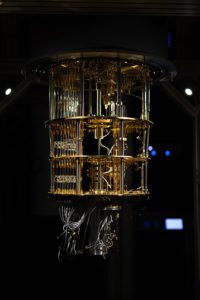Quantum Computing
Quantum computing

Digital information in classical computers is based on bits, i.e. binary states like zero and one.
In contrast to this quantum information in quantum computers is based on QuBits (quantum bits). Unlike classical bits they can also have states between zero and one which is called superposition. This is also possible between different qubits and can lead to entanglement where measurements on one qubit affect another one. QuBits and quantum computers behave completely different to classical ones and totally new concepts apply! QuBits can be realized using quantum mechanical properties of electrons, photons or superconducting circuits. However they are extremely sensitive information states, which have to be preserved for a certain period of time with a currently high technical effort. At the present time (spring 2021), this means maintaining a quantity of up to 100 QuBits over a time span of seconds or minutes.
Similar to classical computers the manipulation of QuBits, for calculations, can be described with so-called quantum gates. An important metric in this context is the fidelity, which describes the probability that the gate behaves as intended and without errors.
Due to the high error rates of quantum gates and QuBits of current quantum computers only fault-tolerant quantum computation is currently available where complex error correction is necessary. In this context one distinguishes between physical and logical QuBits: The physical QuBits (realized in hardware) are used to ensure correct calculations on a (much) smaller number of logical QuBits.
Latest advances in building quantum computers:
- Google has publicly unveiled the Google Sycamore processor with 53 QuBits in 2019: https://doi.org/10.1038/s41586-019-1666-5
- The commercial quantum computer BM Q System One from IBM is currently being built in Stuttgart and will operate with 20 QuBits: https://www.hpcwire.com/2019/01/10/ibm-quantum-update-q-system-one-launch-new-collaborators-and-qc-center-plans
- In the European project AQTION, a quantum computer is being developed at the University of Innsbruck that is based on the storage of individual charged atoms and their manipulation with laser light. A processor is currently being used that supports up to 50 QuBits: https://www.aqtion.eu
Version: 07.06.2021
